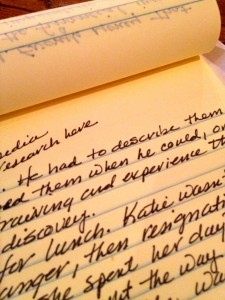
One of Tiptree’s classic stories, “The Women Men Don’t See” may be one of her most celebrated, leading to responses from other writers like Karen Joy Fowler’s “What I Didn’t See” (Kindle version) and my own “Clockwork Fairies” (Kindle version). Tiptree uses her titles to maximum effect and you’ll notice that each of these beginnings interacts in a significant way with the title preceding it.
I see her first while the Mexicana 747 is barreling down to Cozumel Island. I come out of the can and lurch into her seat, saying “Sorry,” at a double female blur. The near blur nods quietly. The younger blur in the window seat goes on looking out. I continue down the aisle, registering nothing. Zero. I never would have looked at them or thought of them again.
The title plays off nearly every line: “I see her first,” (who? is it one of the women from the title?) “a double female blur,” “the near blur,” “the younger blur, “registering nothing,” finishing up with “I never would have looked at them or thought of them again,” at which point the reader is screaming why? why don’t you see them? The answer to that question is crucial to the story.
Here’s another Tiptree beginning, this time of “Houston, Houston, Do You Read?” which uses the strategy of referring to a memory to reveal the conflict. The memory is connected to gender and embarrassment, which will also turn out to be crucial to the story.
Lorimer gazes around the big crowded cabin, trying to listen to the voices, trying also to ignore the twitch in his insides that means he is about to remember something bad. No help; he lives it again, that long-ago moment. Himself running blindly — or was he pushed? –into the strange toilet at Evanston Junior High. His fly open, his dick in his hand, he can still see the gray zipper edge of his jeans around his pale exposed pecker. The hush. The sickening wrongness of shapes, faces turning. The first blaring giggle. Girls. He was in the girls’ can.
“Houston, Houston, Do You Read” is Tiptree at her best, examining gender norms and conventions with a ruthless, scathingly honest eye. Somehow that first moment of embarrassment, that moment of being in “the strange toilet” encapsulates so much of what that story is about and how alien the sexes can be to each other as well as how strange their container, the norms that make them up, which constitute the walls of “the can” itself, are. Look at how the center of his masculinity is framed visually: the gray zipper edge of his jeans around his pale exposed pecker. There is so much going on in that first paragraph, including sensory details like the twitch of his insides, the blare of a giggle, the pattern and threat of a zipper, that it’s worth copying out, pulling apart sentence by sentence to figure out how it’s working.
Let’s finish up with Tiptree in a moment that puts everything up front, in the short story “We Who Stole the Dream”:
The children could survive only twelve minims in the sealed containers.
Woah. We don’t know what’s going on precisely, but we know crucial details. We have a deadline and it is only twelve minims. While we don’t know how long a minim is, we know it’s not much time because of that “only”. Plus, there’s an auditory echo of “minute” that makes us think they’re of similar length.
What’s at stake? This lives of children, for pete’s sake. Not just child, but children, multiple. And we know how they’ll die: suffocation. It would be hard to write a tauter, more dire beginning.
Writing exercise: write three first lines. They can state the stakes, as in the third example, or refer to some memory or object that encapsulates the conflict, as with the example from “Houston, Houston, Do You Read?” Include two titles for each, one that plays off the beginning and one that does not.
For bonus points, read “The Women Men Don’t See” and use that as your inspiration.
Feel free to post some of your best first lines on here, I’d love to see some!









9 Responses
An interesting experiment.
First opening line: “When you’re the kind to get depressed, boredom’s about as dangerous as a gun to the head.”
Didn’t spark anything after the first paragraph; moved on. No titles.
Second opening line: It started out as “Someone had given me an apron, a grown-up’s apron, when I was just a kid.” The story that developed grabbed me so much that I finished it, but I had to change the opening line: “I knew what the package for my daughter was before I even opened the box: my grandmother’s apron.”
The two titles on the second story:
–Doesn’t play: Inheritance
–Does play: Inappropriate Gifts
I went with the second.
I didn’t get to the third opening line 🙂
I think the apron’s a really evocative and interesting gift. Are you writing that story?
Thank you! This was quite inspirational. I only wrote one first line, because I just kept going. So here is my first line, and then what came next:
I love that as a beginning, it’s got tension, it lets us know something’s at stake, and gripping the clumps of mussel is a great tactile moment. Write the rest of the story!
Like San (please imagine the umlaut) my first one turned into a paragraph. Which turned into a kick-start for a WIP that’s been driving me bats:
Have no clue if that HTML will work. Oh, titles? I hate them. I have two approaches, ask somebody else and start with the title. The title that doesn’t play: “Undercover.” It’ll do for a working title.
Anyway, thanx, Cat!
I love how deeply inside the character’s head that is. Lots of great sensory stuff and a real sense of impending conflict.
Late to the party, but I’ve been referring back to this, so here’s mine:
I love that, but you also had me at “crows.” Are you writing the rest of the story?